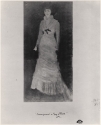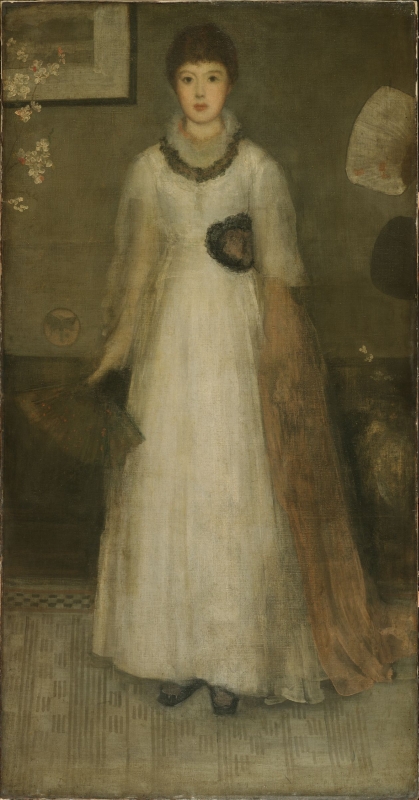Provenance
- 1879: bought through an art dealer by Thomas Way (1837-1915) , London;
- 1916: after his death, sold at auction, Sotheby's, London, 25 July 1916 (lot 77) to Agnew's, London art dealers;
- 1916: sold by Agnew's (a/c #11768) to C. W. Kraushaar Galleries, New York;
- 1918: either sold by them direct to John Frederick Braun (1867-1939) , Merion, PA., or sold to Braun by Mrs Benjamin Thaw (1861–1931) through Henrietta Richardson Hind (Mrs C. Lewis Hind) (1862-1938) ;
- 1926: J. F. Braun owned it until at least 1926.
- 1932-1934: with Grand Central Gallery, New York.
- 1938: Ferargil Galleries, New York;
- 1939: sold to Grenville Lindell Winthrop (1864-1943) , New York;
- 1943: bequeathed to the Fogg Art Museum.
According to Way's son T. R. Way, the painting was 'more or less destroyed' by Whistler at the time of his bankruptcy in 1879, rejected as unsaleable by the auctioneers, and bought by a picture dealer on behalf of Way's father. 1 The daughters of Thomas Way were cited as lenders to the 3rd Exhibition of Fair Women, International Society of Sculptors, Painters and Gravers, Grafton Galleries, London, 1910 (cat. no. 43). Way senior and his wife Louisa (1834-1911) had one son, T. R. Way (1861-1913), and several daughters: Louisa A. Way (b. 1864), Fannie Emmeline Way (b. 1866), Enid Mary Way (1868-1928), Mary Helen Way (1871-1955), and Ethel Kate Way (1871-1940). On their father's death in 1915, probate was granted to two of the unmarried daughters (Ethel Kate and Mary Helen) and a nephew, Arthur Thomas Way.
In the following year, the painting was sold at Sotheby's, bought by Agnew's for £2100, and sold immediately to the C. W. Kraushaar Galleries. According to Watts, writing in 1926, it was sold by Kraushaar to a New York collector, John F. Braun, who owned it until at least 1926; however, according to Mrs Braun, writing some years later, it was sold by Mrs Benjamin Thaw to Braun, through Mrs C. Lewis Hind, in 1918. 2
Its provenance after 1926 is incomplete. It was with the Grand Central Gallery in New York from 1932-1934, but apparently it was not sold. It was advertised for sale in the Art Digest on 1 January 1938 by the Ferargil Gallery, priced at $75,000, and bought by G. L. Winthrop in the following year.
Exhibitions
- 1874: Mr Whistler's Exhibition, Flemish Gallery, 48 Pall Mall, London, 1874 (cat. no. 7) as 'Harmony in Grey and Peach Colour'.
- 1877: possibly exhibited in I Summer Exhibition, Grosvenor Gallery, London, 1877.
Whistler told T. R. Way that it had been 'one of the important works' in his first one-man exhibition of 1874. This is the one certain exhibition of the painting in Whistler's lifetime. It was described in the Builder of 1874 as a picture of a girl 'straight up-and-down in pose and drawing.' 3 It may also have been one of the paintings compared to the work of Diego Rodriguez de Silva y Velázquez (1599-1660) by the Pall Mall Gazette:
'a young girl standing upright, looking forward out of the picture, and with both arms down by her side. In this power of taking the simply unconsidered attitudes of actual life and transferring them directly to the canvas without sacrifice of dignity, and even adding by this means a certain distinction of manner, Mr. Whistler may claim kinship with Velasquez.' 4
It has been suggested, probably incorrectly, that Harmony in Grey and Peach Colour was one of two portraits shown at the Grosvenor Gallery in 1877, 'Harmony in Amber and Black' and 'Arrangement in Brown' (cat. nos. 8-9), and that Harmony in Grey and Peach Colour was probably the latter. 5 The catalogue numbers for these two paintings were undoubtedly transposed; the 'Arrangement in Brown' has been identified conclusively as Arrangement in Black and Brown: The Fur Jacket [YMSM 181].
The main reason for the misidentification was a review of the exhibition by William Michael Rossetti (1829-1919), where he described one of the portraits (which he thought was the 'Arrangement in Brown' but which is now assumed to have been the 'Harmony in Amber and Black') as 'a blonde lady in white muslin with black bows, and some yellow flowers in the corner.' 6 Whistler described the picture quite differently, as 'a young lady in an amber dress with a black ground. ... These were impressions of my own. I make them my study. I suppose them to appeal to none but those who may understand the technical matter. I did not intend to sell the "Harmony in amber and black".' 7 So what to Rossetti was 'white muslin' appears to be, to Whistler, an 'amber dress', which is distinctly confusing. Whistler also stated that he had 'painted over' the 'Harmony in Amber and Black', and it was 'in a transition state.' 8
Rossetti's description of 'Harmony in Amber and Black', appears to match details of three paintings: Portrait of Miss Florence Leyland [YMSM 107], Harmony in Grey and Green: Miss Cicely Alexander [YMSM 129] and Harmony in Grey and Peach Colour [YMSM 131].
The points of resemblance between Harmony in Grey and Peach Colour and Harmony in Grey and Green: Miss Cicely Alexander include the background details of the dado, the dark grey wall, picture frame, blossoms and butterflies, and the design of the dress with its dainty rosette at the waist. Cicely, however, is a young girl, whereas the model in Harmony in Grey and Peach Colour is a young woman.
In some respects Rossetti's description (but not Whistler's) matches Harmony in Grey and Peach Colour more closely. She wears a white muslin dress and there are faint traces of 'black bows' which originally decorated the front of the dress, and there are pink and white flowers at the edge of the canvas, though not yellow ones.

'Arrangement in Grey and Black, No. 2', photograph, ca 1879, signed 1881, Baltimore Museum of Art, 33.53.9055
Nevertheless, Linda Merrill has argued fairly convincingly that the portrait exhibited as 'Harmony in Amber and Black' was yet another painting, Portrait of Miss Florence Leyland [YMSM 107], in its original 1879/1881 version, when it was a portrait of Maud Franklin and was photographed, and as it appears in the photograph above, bore the title 'Arrangement in Grey and Black, No. 2'. 9
It is just possible that like Arrangement in Grey and Black, No. 2: Portrait of Thomas Carlyle [YMSM 137], the Harmony in Grey and Peach Colour [YMSM 131] was exhibited at the Grosvenor Gallery in 1877 but not included in the catalogue, but this is not actually a very likely scenario.
Finally, to round off this confusing array of possibilities, it is conceivable that the 'Harmony in Amber and Black' has yet to be identified, and may have been yet another portrait, possibly of Maud Franklin.
Notes:
1: Way 1912 [more] , pp. 136-37.
2: Watts, Harvey M., 'The John F. Braun Collection of American Art', Arts & Decoration, vol. 25, July 1926, pp. x, 46-47, 77. Mrs Edith Braun to J. Revillon, 28 December 1945, GUL WPP files, Rev 1955.
3: Anon., 'Mr Whistler's Exhibition', The Builder, vol. 32, 25 July 1874, p. 622.
4: Anon., 'Exhibition of Mr Whistler's Paintings and Drawings, Pall Mall Gazette, London, 13 June 1874, p. 11.
5: YMSM 1980 [more] (cat. no. 131).
6: Rossetti 1877 (May) [more] , at p. 467.
7: 'Charge of Libel against Mr. Ruskin', Morning Post, London, 26 November 1878, p. 3; 'Action for Libel against Mr. Ruskin', London Evening Standard, London, 26 November 1878, p. 2.
Last updated: 13th May 2021 by Margaret








